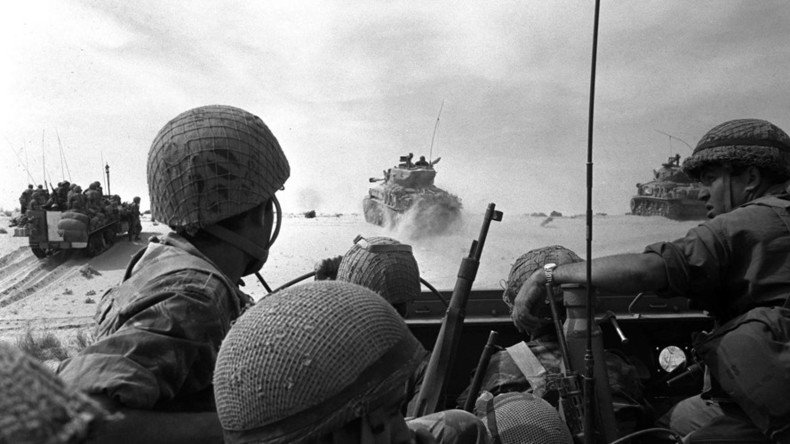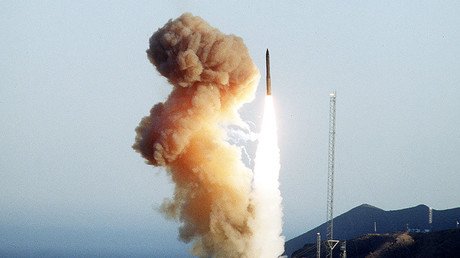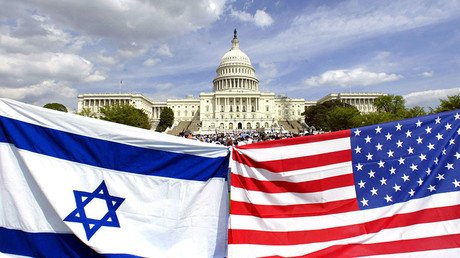Israel planned to use nuclear bomb during 1967 war, new testimonies show

Israel was ready to use an atomic bomb as a deterrent of last resort during the 1967 Six Day War, according to an archive of historical documents and testimonies released by a Washington DC think tank.
The Woodrow Wilson International Center for Scholars released the archive, which most notably includes a series of interviews conducted with the late General Yitzhal Yaakov in 1999 by writer and historian Avner Cohen.
Fifty years ago, in June 1967, Israel was fighting Egypt and four other Arab countries – Syria, Jordan, Iraq and Lebanon. Yaakov was the chief liaison between the Israeli military and civilian defense industry and allegedly put the plan together to use the nuclear bomb as a demonstration of strength.
“Look, it was so natural,” Yaakov said in one of the interviews. “You’ve got an enemy, and he says he’s going to throw you to the sea. You believe him. He says he’s going to throw chemical weapons on you... What are you looking for? Anything you can do to stop him. How can you stop him? You scare him. If you’ve got something you can scare him with, you scare him.”
The plan, code-named “Operation Shimshon” (Hebrew for Samson, the biblical hero), was to have a special forces team from the elite Sayeret Matkal unit drop a bomb on top of a mountain in the Sinai peninsula, some 20 kilometers from an Egyptian military base in Abu Ageila.
The site was chosen as it was far from any major population centers and was meant to send a message rather than inflict mass casualties. Yaakov and his team conducted reconnaissance flights but had to turn back after almost being intercepted by Egyptian jets.
“We got very close,” Yaakov told Cohen. “We saw the mountain, and we saw that there is a place to hide there, in some canyon.”
Had the Israelis followed through, it would have been the third time a nuclear weapon had been used in wartime, after the Americans dropped two atomic bombs on the Japanese cities of Hiroshima and Nagasaki in WWII. It would also have been in contradiction of the 1963 Partial Test Ban Treaty signed by world powers, which banned all nuclear tests except those conducted underground.
Fortunately, the plan, drafted on the eve of the Arab-Israeli war, was never implemented, as the course of the swift conflict did not pose an existential threat to Israel.
Other documents include an interview with then-Israel Defense Forces Chief of Staff Zvi Tzur, who appointed Yaakov to look into the issue. Tzur said the decision to use the weapon would have ultimately hurt Israel.
“We would’ve destroyed everything we had. We would’ve been hurt badly. No one would believe a thing we say,” he told the Yitzhak Rabin Memorial Center in 2004.
Sometime after speaking to Cohen, Yaakov was arrested in Israel and charged with high espionage over telling the story and was given a two-year suspended sentence. He died in 2013.
Yaakov’s testimony seems to show that Israel had nuclear weapons capability as far back as 50 years ago, despite its official stance of nuclear ambiguity – neither confirming nor denying that it possesses a nuclear arsenal, with Tel Aviv keeping its nuclear program under tight secrecy. Mordechai Vanunu, a technician at the Dimona nuclear power plant in the Negev Desert was jailed for 18 years in the 1980s for leaking details of Israel’s nuclear weapons program to a British newspaper.
Some researchers however doubt Yaakov’s story, citing a lack of factual evidence that such a plan had indeed been devised.
“I also interviewed Yitzhak Yaakov and I wasn’t convinced that his story held water. Tens of thousands, if not hundreds of thousands, of classified documents from the Six-Day War have been released,” another historian, Michael Oren, told AP, “and there is not even one shred that supports Avner Cohen’s version. If there was something, we would have found additional evidence.”














